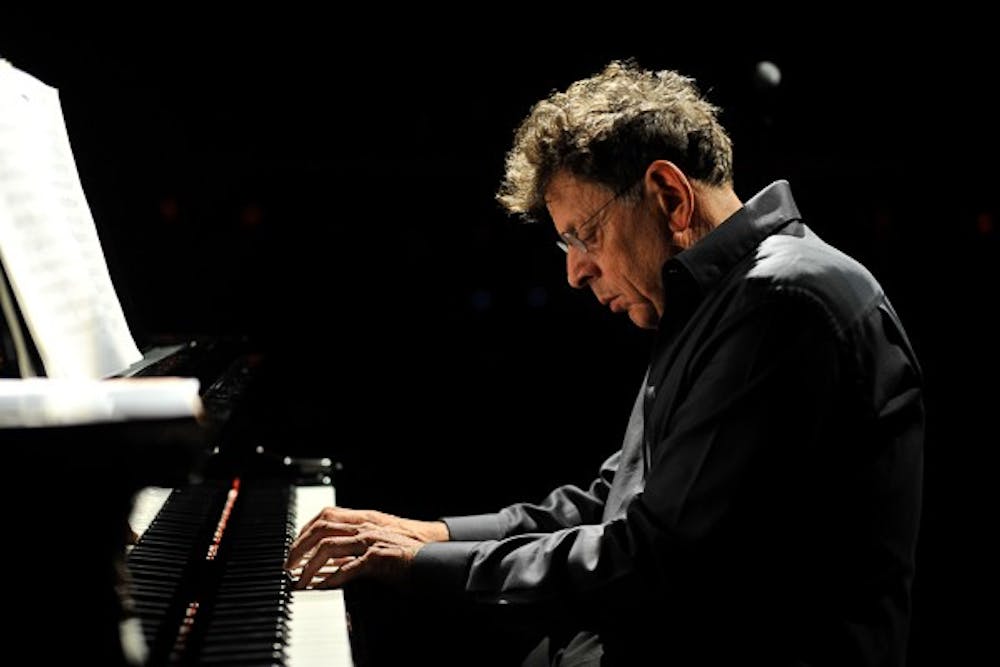It was like a dream I keep having; Philip Glass walked out onto the Gammage Auditorium stage and began playing a piano.
Well, that dream became a reality at 7 p.m. on Feb. 28 at Gammage Auditorium. Glass graced the Valley, playing six of his 20 etudes. Two other pianists played the remainder of the compositions, notably Maki Namekawa and Ashley Oakley. Oakley teaches at ASU and was asked specifically by Glass to perform in this concert. Namekawa, renowned for performing Glass's works, nearly stole the show by wearing heels and a floral kimono.
However, Glass, with his innumerable operas, film scores, quartets, etudes and symphonies, was the obvious headliner.
Gammage Executive Director Colleen Jennings-Roggensack opened the evening, calling it “a remarkable evening for all of us.”
Read more about Jennings-Roggensack and Gammage's 50th here.
She was honored that, after traversing the globe, Philip Glass would choose to play a concert in Tempe, Arizona.
To celebrate 50 years of Gammage’s presence in the Valley, she also invoked a “forward-thinking, greatly intelligent community” that made the art possible. The performance was a part of the Beyond series to commemorate the 50th Anniversary of Gammage Auditorium.
Etudes, practiced and perfected as exercises, help one master a certain instrument. That is, most etudes. Philip Glass’s etudes force the listener to reexamine what’s important in the music. No note should be left unturned by the faithful listener of these compositions. Most of the 20 were commissioned for some special event, including the final three commissioned for Glass’s 75th birthday.
True to Glass’s form, the music was repetitious. It’s not for everyone — I think I heard someone fall asleep in the row behind me.
For those that stayed awake, however, the etudes were fantastic. Many of them featured a middle-register left hand exercise that provided the base of the song, while a right hand would occasionally venture out of that middle register and play, say, a beautifully developed higher register part.
Philip Glass playing his Piano Étude no. 17 on Feb. 28 in Tempe. pic.twitter.com/L7FEasLKe1
— peter w. northfelt (@peternorthfelt) March 1, 2015
In my mind, the standout of the night was Etude 5, played by Oakley. One hand began on the piano, slowly developing. Then, the piece added her right hand, slowly adding more and more complexity. It was a somber reflection by a high priestess of the form. In this etude, I saw a glimpse a deeper place that Oakley was communicating from. While her performance gave only a small glimpse into what was present within her, I could tell the artist was connected with a whole other world.
Etude 6, also played by Oakley, grew from all angles. Listening to this piece is like watching a crystalline structure grow under a microscope. This was another reverent interpretation by Oakley that paid respect to Glass’s original writing.
Etude 13, played by Namekawa is indicative of Glass’s more euphoric work. Again, the middle register builds a foundation and then the scales come. Building down, building up, and finally both at the same time, this piece was the lighter work of the evening.
Oakley played Etude 14, again with reverence. The middle register, this time, is a jazzier foundation, requiring a soulful interpretation of the work. Oakley loved that piano and it loved her back. If you’re going to listen to any of these, listen to this one.
Philip Glass’s 20 Etudes, composed from 1994 to 2013, are a time capsule through Glass’s otherwise far-flung projects.
It was an honor seeing the master of minimalism, and I was pleasantly surprised to see the two musicians he selected to perform with.
Reach the reporter at pnorthfe@asu.edu or follow him on Twitter @peternorthfelt
Like The State Press on Facebook and follow @statepress on Twitter.





